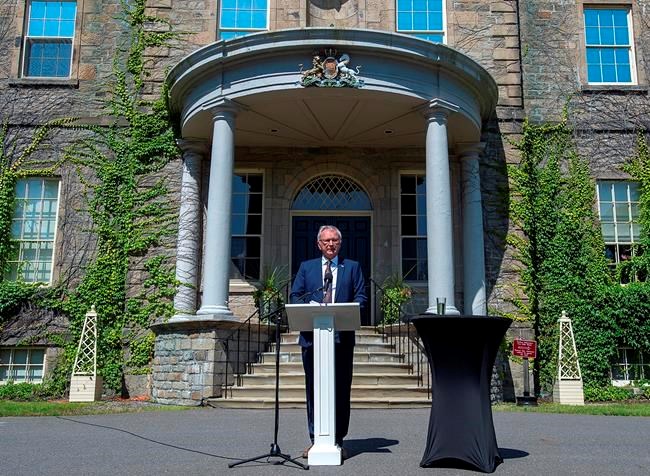FREDERICTON — New Brunswickers will be heading to the polls Sept. 14 after Premier Blaine Higgs on Monday said the province needed stability to face the coming challenges and triggered the first election in Canada since the COVID-19 pandemic hit.
"We are in a pandemic and the coming election campaign will not be like any election we have ever experienced," Higgs told reporters following his meeting with Lt.-Gov. Brenda Murphy, during which he asked her to dissolve the province's 59th legislature.
He said candidates will need to be creative and innovative to get out the vote during the 28-day campaign while they follow health directives to slow the spread of the novel coronavirus.
"As difficult as it is to imagine, our candidates will not be going door-to-door and they will not be leaving any hand-delivered papers or brochures on your doorstep."
Higgs said he spoke with Chief Medical Officer of Health Dr. Jennifer Russell before his decision to call the snap election and she advised that a general election could proceed safely.
The Tory leader said he was forced to go to the polls after the Opposition Liberals abandoned talks on Friday aimed at preventing an election until 2022.
But Liberal Leader Kevin Vickers accused Higgs of listening to political advisors instead of the people of New Brunswick by plunging them into an election they don't need or want.
"Blaine Higgs chose to send New Brunswickers to the polls in the middle of a pandemic," Vickers told reporters outside the legislature. "The premier of New Brunswick chose political opportunism instead of the health and safety of our citizens."
Higgs threatened last week to trigger a provincial vote unless opposition parties agreed to keep his minority government in power until 2022 — or until the pandemic was declared over.
But Vickers walked out of talks aimed at reaching a multi-party power-sharing arrangement Friday, saying they amounted to a power grab by the leader of the Progressive Conservatives.
Vickers said Monday his party was willing to make concessions that would've meant stability in government until well into 2021.
Higgs said he felt Vickers "had a lot of pressure not to get an agreement, not to have a path forward, and I think that's extremely unfortunate."
The premier said this election is about "substance and stability."
"New Brunswickers will need to decide who can lead them into the unknown that may surface in the coming months and years."
Green Leader David Coon said New Brunswickers have greater concerns right now than an election.
"It's very alarming that the premier has called an election during the pandemic when people are so concerned with their health, with the health of their children, the health of their elders and their parents, when so many other concerns are going on," he said.
This campaign, Coon added, will be about the well-being of New Brunswickers.
People's Alliance Leader Kris Austin vowed to increase his party's seat count in the legislature from its current three members.
He said New Brunswickers were pleased with the work of the all-party COVID-19 cabinet committee and have embraced the advantages of a minority government.
"We've seen good changes in the province," Austin said Monday. "We've seen a sense of stability that we haven't seen in quite some time. We've seen varying opinions brought to the table, and I think the people of New Brunswick like that."
Higgs was elected with a minority in 2018 and has said in recent weeks he needed to ensure stability in New Brunswick as the province recovers from the impacts of COVID-19 and prepares for a possible second wave of the pandemic.
On Aug. 10, Higgs invited opposition leaders to talks to reach a formal agreement not to trigger an election until September 2022, or no earlier than 30 days after public health officials declare the COVID-19 pandemic over.
At dissolution, the Progressive Conservatives and Liberals each have 20 seats in the legislature, while the Greens and the People's Alliance each have three. There are two vacant seats and one Independent.
Higgs said Monday the election could be halted or delayed if a major outbreak of COVID-19 occurs during the campaign, but didn't provide details. Chief Electoral Officer Kim Poffenroth recently said there would be no way to stop the campaign once the writ was dropped.
Poffenroth has said more than $1 million had been spent on personal protective equipment for both electors and elections staff for a province-wide vote. She said that included cleaning supplies, hand sanitizer, and additional posters and supplies for mail-in ballots.
About $250,000 will be spent on additional staff for polling stations.
In a recent interview, Poffenroth said a media campaign will be launched to ensure voters understand they don't have to wait until election day to cast their ballot.
"Once the returning offices are open, any elector in the province can go into any of the 50 returning offices, six days a week to vote," she said. "There is also the advance voting opportunities and election day. There's also the opportunity to apply for a mail-in ballot as well."
Poffenroth said her office will also encourage people to go to the polls at off-peak hours in an effort to "flatten the election curve."
"We want to reduce the number of people in the polls at any given time, and reduce the waiting time," she said.
This report by The Canadian Press was first published Aug. 17, 2020.
Kevin Bissett, The Canadian Press



